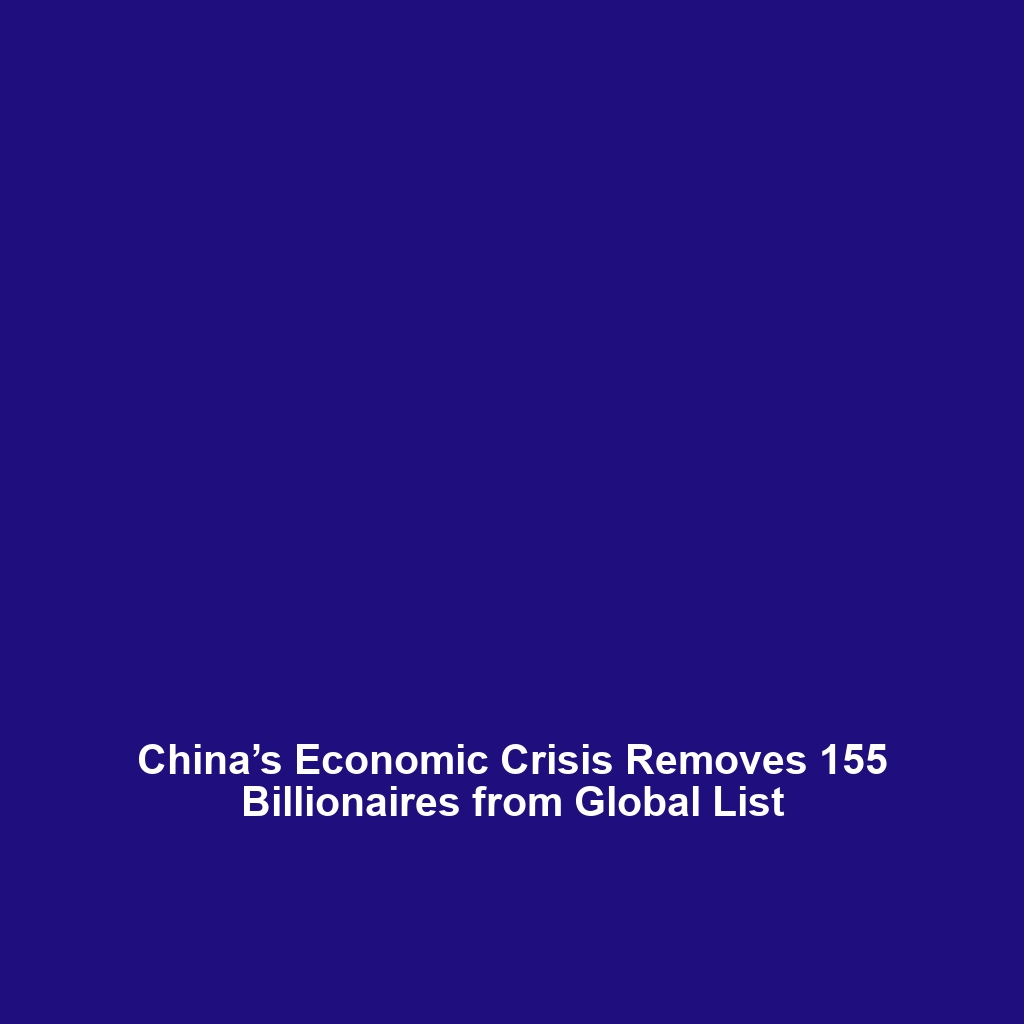Your cart is currently empty!
Tag: Economics

China’s Economic Crisis Removes 155 Billionaires from Global List
China’s Economic Crisis Removes 155 Billionaires from Global List
China’s Economic Crisis Removes 155 Billionaires from Global List
In a significant shift in the global wealth landscape, China’s ongoing economic downturn has led to the removal of 155 billionaires from the billionaires’ list compiled by Forbes in 2023. This decline is largely attributed to a series of economic challenges, including a surge in COVID-19 infections, a struggling real estate sector, and persistent inflationary pressures. As a result, the country’s billionaire count has reached its lowest level in nearly a decade.
Economic Context of the Billionaire Exodus
The removal of 155 billionaires reflects profound changes within China’s economy. According to Forbes, the total number of billionaires in China fell to 1,000, with the collective wealth of these individuals shrinking by $660 billion. Factors contributing to this decline include a prolonged slowdown in economic growth, which has fallen to its lowest rate in over three decades, coupled with external pressures such as rising interest rates and geopolitical tensions.
Impact on Key Industries
The impact of the economic crisis has been particularly severe in several key industries that historically generated significant wealth for entrepreneurs. The real estate sector, a staple of wealth accumulation for many billionaires, has been plagued by defaulting developers and declining property prices. Notably, real estate tycoon Hui Ka Yan, the founder of China Evergrande Group, saw his net worth plummet significantly, resulting in his departure from the billionaire rankings.
Moreover, technology giants have also faced scrutiny, with government regulations intensifying against large tech companies. This has directly affected prominent figures such as Jack Ma, the founder of Alibaba, who has faced challenges from government oversight that has impacted the company’s valuation.
Reactions from Financial Analysts
Financial analysts are closely observing these shifts, with many predicting that the decline in billionaire numbers could have far-reaching consequences for investment and economic recovery in China. Shang-Jin Wei, a professor at Columbia University and former chief economist of the Asian Development Bank, stated, “The loss of wealth among billionaires is reflective of broader economic pressures that could hinder investor confidence both domestically and internationally.”
Wei emphasized that the volatility in wealthy circles could signal a potential reduction in consumer spending and investment in China, which is crucial for economic rebound. As billionaires typically reinvest a significant portion of their wealth, their reduction in status may translate into decreased economic dynamism.
The Global Perspective on Wealth Redistribution
Globally, the reshuffling of China’s billionaire list signifies a broader trend toward wealth redistribution. As wealth concentration diminishes among elite classes in China, countries like the United States have seen an increase in their billionaire counts. For instance, Forbes reported that the United States added 36 billionaires to its list this year, highlighting the stark contrast in economic recoveries.
This international disparity may influence global investment patterns, prompting wealthier individuals to explore opportunities in markets perceived as more stable or favorable for growth. According to recent reports by Credit Suisse, the overall global wealth distribution continues to tilt towards developed nations, raising questions about the sustainability and long-term impact of these economic shifts.
Looking Ahead: What This Means for the Future
As China’s government grapples with these economic challenges, the path forward remains uncertain. Analysts suggest that structural reforms will be essential to restore confidence in the economy and curb the ongoing crisis. A key focus will likely be on regulations that support private enterprise while balancing state oversight to prevent market excesses.
Moreover, amidst the crisis, there are calls from economists like Michael Pettis, a finance professor at Peking University, for more sustainable growth strategies. “China needs to pivot towards domestic consumption and innovation rather than relying on property and investment-driven growth,” Pettis stated.
Conclusion
In summary, the removal of 155 billionaires from China’s wealth rankings not only highlights the depth of the nation’s economic challenges but also serves as a microcosm of the global shifts in wealth and investment patterns. As China strives to regain its economic footing, the implications of this billionaire exodus will likely resonate across markets and economies worldwide. Stakeholders will be keen to monitor how this evolving narrative affects both domestic and global economic prospects in the years to come.
For further reading on this topic, you may wish to explore additional articles on economic recovery strategies in China and the impact of wealth concentration on global economies.

Could Elon Musk Become the World’s First Trillionaire?
Could Elon Musk Become the World’s First Trillionaire?
Could Elon Musk Become the World’s First Trillionaire?
Elon Musk, the CEO of Tesla and SpaceX, is often lauded as one of the most influential business leaders of the 21st century. With the meteoric rise of Tesla’s market value and Musk’s ventures in fields ranging from electric vehicles to space exploration, the possibility of him achieving trillionaire status has sparked considerable speculation and discussion among economists and market analysts.
Musk’s Financial Journey
Musk’s ascent to wealth has been both unprecedented and rapid. As of early 2023, his net worth was estimated to hover around $250 billion, placing him among the wealthiest individuals in history. This financial success has primarily been driven by his stakes in Tesla, whose stock performance has drastically improved over the years, along with contributions from his other ventures, including SpaceX, Neuralink, and The Boring Company.
In 2020, Tesla’s stock surged, leading to a valuation surpassing $800 billion at times, greatly enhancing Musk’s wealth. However, fluctuations in stock prices are common in the tech industry, raising questions about the sustainability of such enormous wealth. Analysts have pointed to Tesla’s innovative technologies and the growing global demand for electric vehicles as key factors that could influence this trajectory upwards.
Factors Influencing Musk’s Potential Trillionaire Status
Several key factors could contribute to Musk reaching trillionaire status:
- Tesla’s Continued Growth: Tesla’s aggressive expansion plans, including entering new markets and increasing production capacity, are expected to significantly boost revenue. The company aims to deliver 20 million vehicles annually by 2030, which if realized, would bolster its market capitalization considerably.
- Renewable Energy Market: As the world shifts towards sustainable energy solutions, Tesla’s innovations in battery technology and solar energy could position it favorably. Analysts suggest that the global transition to renewable energy could double the company’s revenues within the next decade.
- SpaceX Innovations: Musk’s other enterprise, SpaceX, also plays a vital role. With successful launches and contracts with NASA and other organizations, SpaceX has a lucrative future ahead, particularly in satellite deployment and interplanetary travel—a sector projected to explode over the next few years.
Market Challenges and Volatility
Despite optimistic projections, several challenges persist. The electric vehicle market is becoming increasingly competitive, with automotive giants like General Motors and Ford ramping up their electric vehicle offerings. Additionally, concerns regarding global supply chain disruptions, chip shortages, and environmental regulations pose potential risks to growth.
Furthermore, the market often reacts unpredictably to Musk’s public statements and social media activity. For instance, tweets from the CEO about Bitcoin and other cryptocurrencies have historically influenced stock prices and investor confidence, adding an element of volatility during crucial financial periods.
Expert Insights on the Potential Scenarios
Experts in finance and market analysis present varied perspectives on whether Musk could indeed become the world’s first trillionaire. Dr. Robert Shiller, a Nobel laureate and professor of economics at Yale University, emphasizes the “unpredictability” associated with tech companies like Tesla. “While Musk has proven to be a visionary, the path to trillions is fraught with unknowns and potential downturns,” he states.
Conversely, other analysts are more bullish. Paul Gallo, a market strategist at a leading investment firm, notes, “If Tesla continues its trajectory and expands its market share globally, along with the success of Musk’s other ventures, it’s not outside the realm of possibility that he could achieve this milestone in the next decade.”
Implications of Becoming a Trillionaire
If Musk does reach trillionaire status, the implications extend beyond personal wealth. Economically, it would signal a shift in wealth concentration and raise discussions regarding the responsibilities of extreme wealth—alluding to how wealthy individuals can influence socioeconomic structures.
Additionally, such wealth would enhance Musk’s capability to influence various sectors, particularly in space exploration and renewable energy. Musk’s vision for sustainably colonizing Mars or accelerating the world’s transition to sustainable energy could receive unprecedented backing, thereby impacting global policies.
Conclusion
The question of whether Elon Musk could become the world’s first trillionaire remains speculative, hinging on a complex interplay of market dynamics, competition, and geopolitical factors. While the potential for such financial elevation exists, it should be examined alongside market realities that can hinder that pathway. As such, the world watches closely to see how Musk continues to navigate challenges and leverage opportunities in an evolving marketplace.
For those interested in tracking Musk’s journey towards possibly becoming the first trillionaire, following Tesla’s developments and Musk’s multi-faceted ventures remains paramount. With the automotive industry no longer a solitary battleground and space exploration gaining momentum, the coming years are sure to be pivotal not only for Musk but also for shaping the global economic landscape.


